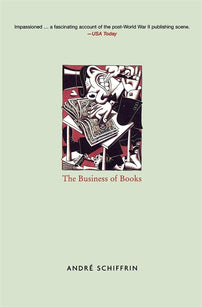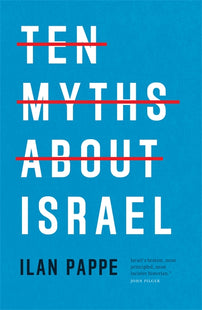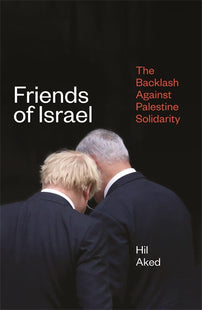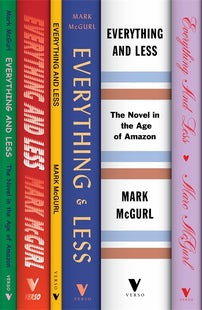Publishing in a crisis
In response to the BLM protests, book publishers from giant majors to tiny indies rushed to respond. Nothing comparable has happened in response to the genocide in Gaza. But what role should publishers have in times of crisis, if any at all? And can they show solidarity without diluting a movement's radicalism?

Image: La fabrique éditions, X.com
Last year’s Frankfurt Book Fair, the most significant trading event in the global publishing calendar, came just weeks after the events of October 7th. As the atrocities of the Gaza genocide were already mounting, Juergen Boos, president and CEO of the Book Fair, released a statement whose words were at once generic and unabashed. “Frankfurter Buchmesse,” he said, “has always been about humanity … This humanity has been shattered once again by the attack on Israel by Hamas’s terrorists"; a statement seemingly designed to occlude the possibility that Palestinians were a part of humanity, too. Meanwhile, his colleague Richardo Franko Levi, president of The Federation of European Publishers, announced that “books should be the vehicle of peace and democracy everywhere in the world.” Shortly after this nod to the democratising role of literature, Frankfurt Book Fair, along with Litprom – the German literary society, which shares Boos as a president – disinvited the Palestinian author Adania Shibli, and cancelled her planned award, without the writer’s agreement, having just created additional stage time for Israeli artists.
Although some pointed to the specificities of German history and society as context for, such a position was undermined by the Frankfurt Book Fair’s historically open policy on exhibitors. Publishers from across the world, Palestinian publishers among them, have long shared space in its halls with extremist groups, including some with close links to Neo-Nazism. When Boos spoke on the first day of the fair, suggesting that books may be a cure for the moment, imbued with the strength to shake the world, he would have known that he was talking to a group of people well-used to such senile publishing speak. The business has long emboldened its staff to take at face value the claim that their work is, as a matter of course, world-altering, without closer scrutiny of this oath.
Some publishers soon dropped out of the fair, leading Boos to add some small changes to his earlier remarks. But the fact that he received no real or coordinated heat from the peers he might deem truly worthy opponents goes some of the way to explain why he was able to say in an interview that, if tasked with handling the situation again, he would “do nothing different.”
Where the major publishers wavered, independents stepped in, vigilant of the McCarthyite repressions to come. Publishers for Palestine, a global solidarity collective of over 400 publishers, was formed while the fair was taking place to stand “against the chilling complicity of Western media and cultural industries.” Book Workers for a Free Palestine, established earlier this year, consists of some 175 individuals from over 15 different publishers and agencies, addressing “the literary industry’s silence around the ongoing genocide.” Writers Against the War on Gaza was founded to create a “cultural front for a free Palestine.”
Other organisations adjacent to the industry, however, like PEN International, have seen fractures emerge. Although PEN has autonomous groups in over 90 countries, its underlying rationale is supposedly panoptic: “Freedom of expression is deteriorating worldwide, threatening the lives and wellbeing of writers.” Enter PEN. But how freedom itself is defined, and appraised, has been a point of dispute. English PEN, its British chapter, for example, released a statement calling for a ceasefire on 25th October, and has worked with independent bookshops to raise money for the PEN Emergency Fund For Writers at Risk to support writers in and from Palestine.
The American chapter, PEN America, on the other hand, has been criticised for a number of failings. The organisation repeatedly refused appeals from the literary community to call for a ceasefire, leading nine of the ten recognised nominees, including the novelist Camonghne Felix, to decline a place in the longlist for the PEN/Jean Stein Award, “in solidarity with the ongoing protest of PEN’s continued normalisation and denial of genocide.” Palestinian-American writer Randa Jarrar, along with other members of Writers Against the War on Gaza, were dragged out of a PEN event while protesting the deaths of thirteen writers and poets that had been killed by Israel, and condemning PEN for inviting ceasefire opponent, Mayam Bialik, into their space. Against the backdrop of its outspoken response to the Russo-Ukrainian war, PEN America's CEO Suzanne Nossel, when addressing the war in Gaza, declared: “We’re not dogmatists. We’re not racing to be the first, the loudest, or most severe in our rhetoric.” A rather dubious retaliation from an organisation that aspires to clamour the moment a writer is detained for political views, hoping that same writer will attend their gala dinners upon release. PEN’s public persona is built upon playing protector. What exactly it is that PEN America thinks it’s protecting today is far from clear.
[book-strip index="1"]
Noticeably absent have been the major publishers, with the industry’s response to the war driven by the indies. We should, though, in the context of such crises, ask just what role the industry can in fact play, if one exists, internally or by way of output. The horrifying scenes from Gaza have not abated, deluging our screens: hospitals and tents bombed; bodies burned alive within the designated safe zone in Rafah. Against this, it is hard not to be reminded of the industry’s response to the George Floyd uprisings in 2020. Then, we saw a major and concerted effort on the part of the industry to place itself at the centre of events.
Publishing has always enjoyed the flexibility to embrace both sides of an issue; the same imprint can publish a pioneering voice on social justice rights alongside another who denies the basis of those very rights. In 2020, however, there was little impartiality. What the industry did instead was to make something close to a harmonised intervention, even if it was one that was mostly divorced from events on the ground, and that at times verged on wilful cluelessness of the movement's stakes.
That movement, that sprung up in the streets, was in response to the oppressions of police and state violence. The publishing industry, somewhat crassly, took the BLM moment as its moment to shine, with publishers entering into what felt like a competition on who could level up the fastest, and who cared the most. CEOs from each of the British and US wings of the Big Five publishers (Simon & Schuster, Penguin Random House, Macmillan, Hachette, and Harper Collins) released statements committing them to addressing racial inequality in the book world. Simon and Schuster CEO, Ian Chapman, claimed that “Black Lives have always mattered to us at S&S. Now is the time for urgent action across our business to redress the imbalance.” For a brief moment, Black Lives Matter became the industry’s raison d'être.
Following the protests, there was at first an almost immediate conflation of any and every book on race and racism with literature that would make sense of police brutality. Reni Eddo-Lodge, whose break-out success, Why I’m No Longer Talking to White People About Race, published three years before in 2017, expressed discomfort at “profiting every time a video of a black person’s death goes viral,” urging readers to match the book price with a donation to the Minnesota Freedom Fund. Others that dominated the bestseller lists at the height of the movement included So You Want to Talk About Race by Ijeoma Oluo, and Robin Di’Angelo’s White Fragility, whose subtitle, ‘Why It's So Hard for White People to Talk About Racism’, offered a paradoxical expression of scepticism towards speaking and a promise of inauguration for those that could pull it off. A simple reading of the industry’s it’s-time-to-talk stance would concur that talking about race is often a difficult but necessary first step; a more realistic one might be that publishing never wanted us to move beyond it – to action.
As with the recent Palestine protests, the BLM movement saw huge numbers of people taking to streets across the globe. There was then, as there is today, an appetite for a movement that could hold the powerful to account, even if it was not yet sure where to situate justice. The industry, in attempting to designate what constitutes wholesale appeal, with whatever fell outside of it marked as niche, frequently neglected the bigger questions that lead people to the streets in the first place. Initial curiosity was slowly toned down as readers were asked to revert back to conventional ways of thinking for why things are the way they are: the answer almost always located in the individual. If enough of the population can read Ibram X. Kendi’s handbook, it was thought, in the liberal imagination, and learn to be better antiracists, or read and partake in Layla F. Saad’s 28-day programme on dismantling personal privilege, somehow, we may not have to watch the brutal videos we did in 2020.
To say that publishing is simply a reactive force, beholden to a preexisting market, misses out the role it plays in shaping consumer demand. Against the odds for a radical independent publisher, Mariame Kaba’s book on abolitionist organising hit the NYT bestseller list in 2021. Crises almost always up a space to overhaul previously ubiquitous narratives, and in this commercial success can be found, often in books that may have had their radical politics or challenging ideas adapted by mainstream presses.
[book-strip index="2"]
The industry’s priorities during 2020 were largely self-serving, but it is worth asking why there has been no similar navel-gazing since the end of last year. The usual argument is that Palestine / Israel is a divisive topic in a way that other crises are simply not; that it always has been, always will be, and that the hesitation, perhaps even suppression, we are witnessing today results from this fact. Yet, there is something to be said for the notion that if we had in fact made qualitative progress in reckoning with racial violence after 2020 – a longstanding relationship between race and killing being the defining characteristic of both crises – we would have come further in our freedoms to speak out against the violence today. This headway is discernible in public space, where a commitment to marching on the weekends or setting up encampments at universities shows no signs of wavering in the face of the often punitive consequences, but not in the cultural industries, currently defined by censorship, job losses, or blanket silence.
There has a been a long and complex history of solidarity between Black Americans and Palestinians, and Black Lives Matter, a decentralised and by no means monolithic movement, has in large parts adopted the Palestinian cause as their own. Yet, in the messaging pushed out by the publishing industry, these values were either diluted or obscured beyond recognition. We were largely asked to consider antiracism as a wholly contemporary phenomenon, divorced from its traditions, with many writers failing to recognise those before them who would assist us in deciphering how this explosively energetic moment came to actualise.
To return to the question of the activist drive within the industry, there has been much that is worth celebrating. But the lessons of BLM are instructive. To what ends are we working? Would it be a ‘coup’ if we got those same CEOs to release statements again, as in 2020? The answer is almost certainly no, especially when we revisit those superficial statements again today. If publishers released statements calling for a ceasefire, however, it may hold more weight than their former attempts to turn our attention away from the violence in the streets towards diversity in the boardroom. Some donations were made in 2020 – Hachette UK, for example, donated £10,000 to The United Families and Friends Campaign, a coalition of families and friends of those that have died in police custody. If that same money was pledged today, to charities like Medical Aid for Palestine, intent aside, the result would be necessary material gains during an ongoing humanitarian emergency.
Linking the work of activists in the industry to BDS motions, in the case of Palestine, holds open more space for directly political objectives and outcomes. Recently, Fossil Free Books have been successful, in collaboration with workers in the book industry, in pressuring the Hay Literary Festival to drop the asset management firm Baillie Gifford as a sponsor due to their links to the fossil fuel industry and investments in Israeli arms. In the coming months, debates will likely extend beyond the original conceptualisation of BDS to questions of how far the boycott should apply to companies or organisations who support repression in any form.
The Black Lives Matter movement resulted in many gains, but its ideals were in large part coopted by a liberalism that was damaging to the work (the pernicious cycles of contortion that antiracism is especially susceptible to were captured several decades ago by the work of A. Sivanandan). The determination we’re witnessing today may be crucial to any future antiracist agenda, but this will depend upon which ideas become commonsense. Jeff Halper, for example, argues that the liberation of Palestine will require replacing the Israeli-Palestinian conflict framework with the framework of settler colonialism. Publishing has, in recent years, seen a number of notable successes with books about colonialism, and Britain’s role in the colonies remains a subject of fascination for many readers. Will the same happen with Palestine / Israel?
If the major publishers, in contrast to the independents, are characterised by a hesitation to take risks, then perhaps we can’t yet know how the industry will respond to the ongoing barbarity. It may fall, as it often does, to the indies to platform original work and ideas before bigger presses loom up on a similar space. What we can count on the corporates for is not an aptitude to be on the right side of history, but a capricious propensity to move to where the money is.
Writing for Literary Hub during the Simon & Schuster Antitrust Trial in 2022, Margot Atwell of Feminist Press reported that the independents were referred to by witnesses as “farm” or “feeder” teams, the implication being that indies “exist solely to develop raw talent to the standards of the Big 5 or 4 – and to their benefit.” Although Atwell interpreted this as an insult, and it was likely meant as one, it was perhaps a display of self-awareness from the conglomerates who commission books on autopilot mode. If the goal is to lay cash at an author’s door following their success with a smaller press, rather than detecting talent early on or working with debut writers to nurture their ideas, this is hardly an insult to the independents who are skilled at the latter, as much as it is a concession from mainstream publishing of its Achilles heel. The fact that the corporates so closely watch the work of the independents only affirms that most of the interesting ideas originate there.
The notion of change makes its way into the majority of conversations about books. Compelling writing, we hope, will cause shifts in both our inner lives and in the wider world. All publishers, from independents to conglomerates, work the term into their tag lines and marketing materials. Some of the negative reactions to Fossil Free Books and other activist incentives show us how the industry’s self-image splinters when mirrored with its realities. Proactive efforts towards freedom for Palestine point to where an inherent value in books, if one even exists, may reside. Yet, these commitments are converted into perceived threats to the role of literature, and dehumanising narratives that we should be working to unwind, are, in the dubious name of preserving plurality, kept firmly intact. The industry is prone to standing up for an abstract belief in change; one so vague in definition that it’s often standing for very little all. It is perhaps for this same reason that publishers have gone round in an obstructively circular motion on antiracism since 2020, struggling to leave behind imitations of progress. The complicity of the cultural industries that Publishers for Palestine refer to as ‘chilling’ today, is in some ways a hallmark of publishing in its contemporary formation.
The industry would do well to consider whether it indeed has any role to play in crises – a question that is no doubt an open one – and in the meantime, so as not to condescend readers, refuse to assume that playing a serious role in anything is somehow inherent to its character.
Neda Tehrani is a commissioning editor at independent publisher Pluto Press.



